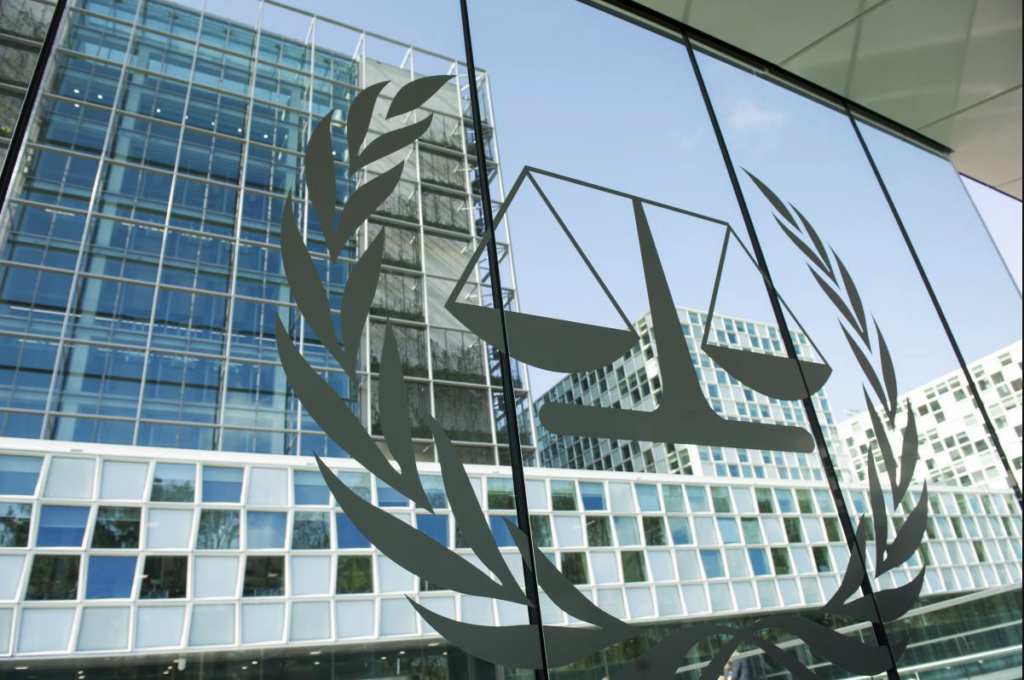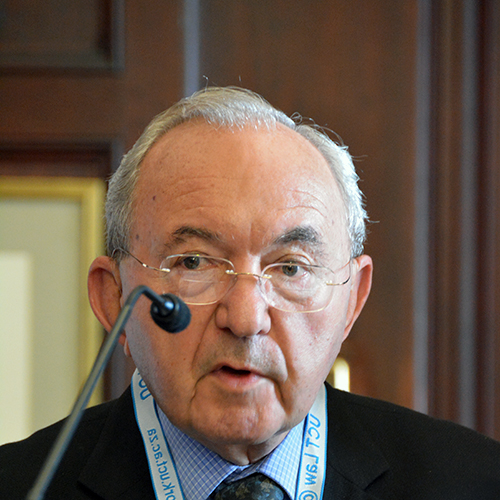Africa Group for Justice and Accountability member Judge Richard Goldstone co-authored a 14 August 2020 Daily Maverick opinion column with Accountability Now Director Paul Hoffman in response to a comment from Oscar van Heerden that “Another ANC power struggle looms over SA’s withdrawal from the International Criminal Court”.
You can read Judge Goldstone and Mr Hoffman’s op/ed at the Daily Maverick, or, see it below:

ICC headquarters in The Hague. Image courtesy of the ICC.
The International Criminal Court (ICC) in The Hague is a much-misunderstood independent body created in terms of the Rome Statute in 1998. Nothing demonstrates the force of this proposition more than the content of this week’s Daily Maverick Opinionista piece penned by Oscar van Heerden.
He is entitled to his opinions regarding the efficacy of the ICC, but he should not be allowed to misrepresent the law or distort the facts in order to support his opinion.
The first and most fundamental error Van Heerden makes is to mischaracterise the nature of the jurisdiction of the ICC. It is a court of last resort. This feature of its make-up means that the ICC is only called upon to act when the criminal justice administration of states has broken down to such an extent that crimes against humanity and war crimes (including genocide) perpetrated by or in those states are not addressed by the criminal justice administration of the states in question. These steps are ordinarily taken through proper investigation of allegations, fair trials before impartial courts and appropriate punishment of the perpetrators of the evil deeds that crimes against humanity and war crimes entail.
This doctrine of complementarity is specifically designed in such a manner as to ensure that the sovereignty of states capable of dealing with the serious crimes over which the ICC has complementary jurisdiction is respected by the ICC.
These facts and circumstances appear to have eluded the attention of Van Heerden in his precipitate rush to judgment condemning the ICC.
The history of the ICC is instructive: the crux of its role lies in enforcing and inducing compliance with specific norms of international law aimed at outlawing and preventing mass violence.
Confronted with the extensive perpetration of unspeakable atrocities during World War II, the international community articulated an unparalleled call for justice and, for the first time, international respect for human rights. It sought to put an end to such crimes through, inter alia, the adoption of the Convention on the Prevention and Punishment of the Crime of Genocide, the four Geneva Conventions and the Nuremberg Principles. The Universal Declaration of Human Rights in 1948 is in the same vein.
The propensity of humans to be unspeakably cruel to their fellow humans is well documented in the history of the 17th century in the Americas and the 18th century in the annihilation of indigenous populations in Australia. The US Civil War involved 750,000 casualties while elsewhere in the 19th century in the processes of colonialism worldwide, untold millions died both before and after the abolition of slavery. The 20th century in Europe, with its two world wars and the genocide perpetrated by the Nazis against Jews and others, did not reduce the global death toll in any way.
The formation of the ICC and its coming into operation at the commencement of the 21st century is aimed at reversing this atrocious litany of the history of inhumanity.
In the absence of credible enforcement mechanisms, violations of international humanitarian law continued with glaring impunity after the formation of the UN in the wake of World War II. In response, the international community decided to take joint action by creating an interconnected system of international justice to prevent impunity for the worst atrocities known to mankind. On 17 July 1998 this vision materialised when states adopted a multilateral treaty called the Rome Statute of the International Criminal Court, under the auspices of the UN. With the entry into force of the Rome Statute on 1 July 2002, the first permanent international criminal court, the ICC, came into being.
The Rome Statute and the ICC have made particular advances in combating impunity in relation to crimes against children and women. The Rome Statute extensively codifies such acts and requires the organs of the ICC to have particular expertise on violence against women and children. In fact, gender crimes were featured in the vast majority of ICC cases to date.
The current National Director of Public Prosecutions in South Africa, Shamila Batohi, was the director of the legal advisory section of the Office of the Prosecutor. She was instrumental in the formulation of the policy of the ICC as regards the issues affecting women and children and remains a champion of the continued membership of the ICC by South Africa.
South Africa made a valuable contribution to the formation of the ICC under the leadership of Nelson Mandela. The new constitutional dispensation which began under his leadership seeks to build a united and democratic country able to take its rightful place as a sovereign state in the family of nations. The Mandela administration clearly saw its role in the establishment of the ICC as contributing to the realisation of that constitutional goal. Mandela himself directed that negotiations take place in Pretoria to secure the buy-in of Africa to the ICC. It was Mandela who “cajoled” the SADC countries to ratify the Rome Statute.
Some specific assertions made by Van Heerden cannot be left unchallenged: neither the nature of the “threats” nor the identity of the states alleged to be making them are identified by him. Is there really any “former colonial master” or “stronger trading partner” guilty of threatening any consequences for African countries that may wish to withdraw from the Rome Statute?
It is doubtful that the best interests of South Africa would be served by turning away from the 123 countries (not 103) who comply with the norms of international law to join the ranks of the countries named and shamed by Van Heerden. Joining them is surely not a defection which could engender any national pride in our commitment to compliance with the norms of international law and indeed with the rule of law itself.
As to the role of the Security Council of the UN: under Article 13(b) of the Rome Statute the Security Council may “refer” a situation to the prosecutor of the ICC. Even though it is unlikely, the independent prosecutor has the discretion not to proceed with any case so referred. It is simply not so that non-signatory countries can instruct the ICC on what to do about any situation involving suspected crimes against humanity.
In his example about taking Israel to the ICC, Van Heerden reveals just how muddled he is in regard to the legal situation. Apart from requests of the kind made under Article 13(b), referred to above, the UN Security Council has nothing to do with the cases processed by the institutionally independent ICC.
It needs to be emphasised that the ICC is not an organ of the UN. However, under Article 16 of the Rome Statute, the Security Council, acting under Chapter VII powers, may, in effect, force the ICC to defer cases for periods of 12 months in circumstances in which the threats to international peace and security so demand. Here the veto works the other way: any permanent member can, if so advised, veto the deferral of the case.
On the facts of the Israel case it needs to be pointed out that South Africa has not taken Israel to the ICC. The question currently before the court is whether Palestine has the necessary jurisdictional standing to do so.
If Van Heerden wishes to take his antipathy toward the dual nature of international structures to its logical conclusion, then South Africa should withdraw from the UN and all international organisations under its aegis. Effectively withdrawing from the family of nations is the antithesis of what is contemplated in this regard in the preamble to the South African Constitution.
A court of last resort, operating under the strictures of the doctrine of complementarity, is a valuable addition to international governance. It is one that is deserving of the continued support of South Africa and all other peace-loving nations.
South Africa acted unlawfully and in contempt of court in relation to the protection afforded to the now-disgraced “Butcher of Darfur”, Omar al-Bashir, during the Zuma administration. The poor judgment calls made then should not be repeated now.
The issues ventilated by Van Heerden have to do with the standing of South Africa as a member of the family of nations. They ought to have nothing to do with petty squabbles between factions of a political party. As a constitutional democracy in which the rule of law is regarded as supreme, it is clear where South Africa’s higher duty lies.


